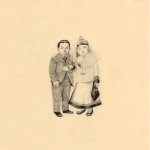The Decemberists, The Crane Wife
reviewed by dave heaton

The Crane Wife invites me to rearrange it, mentally if not physically. I get the most out of it when I approach it with its parts separate in my mind, when I subdivide it into at least four parts:
--The second song "The Island" is its own three-part epic in the style of 2003's The Tain EP. It's a rape-and-pillage tale, and the band uses that darkness as a reason to go for broke with classic-rock drama, with a bombastic style up until the ending, a fragile ballad of death. This track is why somebody referred to the Decemberists as "the new Jethro Tull," a comparison that would turn me away instantly if I hadn't heard their music already (who needs a new Tull?). Musically it fits into The Crane Wife awkwardly, at least compared to the sole-minded style diversion tactic used by making The Tain on its own recording.
--The fifth song, "The Perfect Crime #2", is similar in its overwhelming tone, though here the rock is more funk-based…and the story has been cut in half. We're hearing the second half of a robbery tale, a section of another epic.
--The title-bearer is a three-part story itself, here divided between the album's first and ninth tracks. It's a stirring, complex fable with a sad ending. The Crane Wife opens with the ending, hooking us into the album's overall tone of tragedy, while allowing another song to end the album on a more hopeful note.
--That song is "Sons & Daughters" – bearing a lingering hook, resplendent with hope, sung as a round at the song's end: "Hear all the bombs / they fade away." It's one of the songs that are more representative of the style of pop on the other Decemberists albums, albeit showing the same expansion of songwriting range that each album has displayed.
It's also in the subcategory within the album of songs set in the context of war, a setting that of course gives them a contemporary relevance even if the war in each song might have occurred hundreds of years ago. There's at least three gorgeous wartime love songs – the conversational duet "Yankee Bayonet (I Will Be Home Then"), the spunkier "O Valencia!", and "Summersong" – each carrying ambiguities stretching beyond any strict love-song category. "When the War Came" rages like a storm with the bleakness of war, and to get that mood the band goes back into full-on rock mode. It's a buildup of horror that makes "Sons & Daughters", which feels in some way like its flip-side, all the more hopeful. The dark "Shankill Butchers" – which once upon a time would have been musically most representative of a Decemberists album but here in a way stands alone – is more an evil fairytale about murderers "for whom killing is their only source of joy." It fits right into the world of Grimm and so on, but it's hard not to think of real-life blood-hungry leaders as it plays.
On The Crane Wife the Decemberists are telling stories in forms both epic and intimate; the link among them is often sadness, death, murder, and pain. As a recording it doesn't have the same direct impact as their earliest work (in a way, each release has been less direct than the previous), but there's more corridors and paths to follow here. They're well-skilled in the various ways a story can be told in song, and here they're also enjoying messing around with those ways, with the affect a story has if it's split up, for example, and the impact of different styles of drama. I respect their storytelling ability/songwriting ability and their willingness to mess with formats and approaches. That said, I'm looking forward to messing around with The Crane Wife a bit myself, making it fit my own tastes by utilizing the same sort of rearrangement. First I'll take "The Island" and make it its own imaginary EP. Then I'll go with a song order of my own choosing for my imagined The Crane Wife (more like this: tracks 7, 3, 4, 8, 9, 1, 5, 6, and 10.)
Copyright (c) 2006 erasing clouds |
|